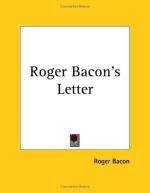|
This section contains 3,264 words (approx. 11 pages at 300 words per page) |

|
SOURCE: "Roger Bacon," The Contemporary Review, Vol. II, May-August, 1866, pp. 364-92.
In the following excerpt, Plumptre offers a general estimate of Bacon's teaching on universals and of his views on ethical and political philosophy. The critic also discusses the relation in which Bacon stood to the religious life of Oxford and of England.
Few of the chance coincidences of history are more striking than the fact that the great philosophical reformers of the thirteenth and the seventeenth centuries, who fought the same battles against the same foes, who used almost the same weapons, should have also borne the same name. So strong is the resemblance of thought and feeling, that it would not be difficult to select passages from Roger, which, to nine readers out of ten, acquainted only with the latter, would seem to have been written by Francis, and it is quite conceivable that the students...
|
This section contains 3,264 words (approx. 11 pages at 300 words per page) |

|


